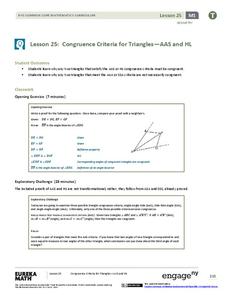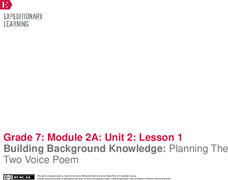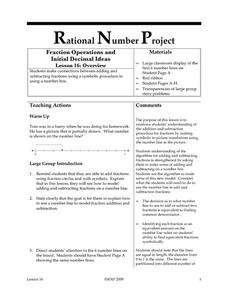Curated OER
Mini-Lesson Planning for Inferences
Making inferences and drawing conclusions is a key component to successful active reading. Encourage your class to use context clues and prior knowledge to infer different elements of a story, including the setting, plot, and character...
Curated OER
Lesson 2: The Constitution: Our Guiding Document
Explore the structure and content of the US Constitution in the second lesson of this five-part social studies series. A collection of activities, games, and videos complement a class reading of a document summarizing the US...
BrainPOP
Civil Rights Lesson Plan: Tracking History Through Timelines
Use the accompanying assessment to determine your class's prior knowledge on Martin Luther King, Jr. before beginning a lesson on the famous civil rights movement leader. The resource has young historians thinking about life for African...
Curated OER
Myth Lesson Plans
What is the difference between myths, legends, and folktales? From greek mythology and creation myths to heroes and heroines, here is a nice series of lessons for providing your kids with solid foundational knowledge about myths.
Rational Number Project
Initial Fraction Ideas Lesson 22: Overview
Have young mathematicians subtracting fractions in no time with this manipulative-based math lesson. Using their sets of fraction circles, students explore a number of word problems involving the subtraction of fractions before working...
National Endowment for the Humanities
Revolution '67, Lesson 2: What Happened in July 1967? How Do We Know?
Even in a world in which dozens of participants and curious onlookers record every controversial event, the basic facts of what happened are often in dispute. Revolution '67, Lesson 2 explores 1967 Newark, New Jersey using an examination...
Scholastic
Lesson One: The Earth, Background and Glossary
How much do you really know about our planet? Middle schoolers build up their prior knowledge about Earth, its placement in the solar system, its composition, and important geological vocabulary with an introductory earth science lesson.
Center for Civic Education
Lesson 1: Who Can Vote in the United States?
The purpose of this first lesson in a series of five about enfranchisement and suffrage is to determine what class members already know, or think they know, about voting and voter registration. Groups answer questions on the provided...
National Security Agency
Classifying Triangles
Building on young mathematicians' prior knowledge of three-sided shapes, this lesson series explores the defining characteristics of different types of triangles. Starting with a shared reading of the children's book The Greedy Triangle,...
K20 LEARN
Things Are Lit at Thornfield: Jane Eyre
Jane Eyre offers scholars an opportunity to practice reading comprehension skills. Pairs are assigned a word from the text, use their prior knowledge, and consider the context, connotation, and denotation of the word to posit a...
Arizona Department of Education
Area and Perimeter of Regular and Irregular Polygons
Extend young mathematicians' understanding of area with a geometry lesson on trapezoids. Building on their prior knowledge of rectangles and triangles, students learn how to calculate the area of trapezoids and other irregular...
Kentucky Adult Education
Probability Lesson Plan
Roll the dice with this multimedia math lesson on probability. After first viewing a series of three short videos explaining probability, independent events, and dependent events, young mathematicians complete a set of practice...
West Contra Costa Unified School District
Standard Form of Conics
Looking for a complete go-to guide for the standard form of conics? This five-page packet does a nice job of connecting conics to prior knowledge of functions and transformations. Adapt the resource as Algebra II lesson plan notes, or...
EngageNY
Congruence Criteria for Triangles—AAS and HL
How can you prove it? Guide classes through an exploration of two possible triangle congruence criteria: AAS and HL. Learners connect this criteria to those previous learned and also explore criteria that does not work. The lesson...
ReadWriteThink
Living the Dream: 100 Acts of Kindness
Inspire kindness in and out of school with a lesson that challenges scholars to perform 100 acts of kindness during the time between Martin Luther King Jr. Day to Valentine's day. Leading up to a celebration of friendship, learners...
Cornell University
Buoyancy
Swimmers know to float by turning their bodies horizontally rather than vertically, but why does that make a difference? In an interesting lesson, scholars explore buoyancy and the properties of air and water. They test cups to see which...
EngageNY
Building Background Knowledge: Planning The Two Voice Poem
Scholars build background knowledge to understand the life and work of the union leader and labor organizer César Chávez. As they read teacher-selected resources, they complete a Building Background Knowledge worksheet and engage in...
NOAA
An Ocean of Energy
Young biologists trace the path of the sun's energy through marine ecosystems in the second part of this four-lesson series. Building on prior knowledge about producers, consumers, and decomposers students are introduced to the concept...
West Contra Costa Unified School District
Properties of Multiplication
Unlock the keys to fluent multiplication with this upper-elementary math lesson plan. After an introduction to the five properties of multiplication, students match cards with different math problems to posters describing each property,...
Curated OER
Plate Tectonics: Sixth Grade Lesson Plans and Activities
Here is a set of pre-lab, lab, and post-lab lesson plans on plate tectonics. After completing the previous labs on volcanoes and earthquakes, sixth graders use the gained knowledge to explore plate boundaries and the movement of Earth's...
Prestwick House
Vocabulary Lesson
Vocabulary instruction works best when taught within a larger context. A vocabulary activity builds connections by using synonyms to help learn the meaning of new words. This helps connect the words to prior knowledge and give them context.
University of Minnesota
Fraction Operations and Initial Decimal Ideas
Add another strategy to the toolboxes of young mathematicians with this elementary math lesson on using number lines to add and subtract fractions.
West Contra Costa Unified School District
Using Derivatives to Graph Polynomials
You can learn to graph as well as a calculator using calculus. The lesson introduces using derivatives to find critical points needed to graph polynomials. Pupils learn to find local maximums and minimums and intervals of increase and...
Texas Education Agency (TEA)
21st Century Employability Skills
What is a career portfolio? Class members complete a KWL chart to determine their prior knowledge about portfolios, and then view a PowerPoint about 21st century employability skills. Next, they write a resume before creating and...

























